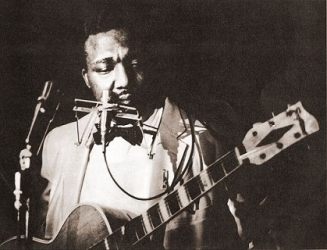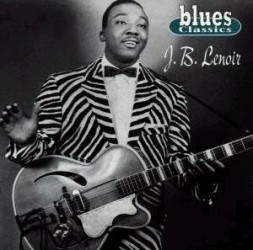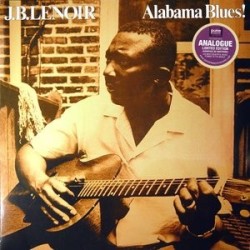Down In Mississippi
Down In Mississippi
On June 21, 1964, three young civil rights workers—a 21-year-old black Mississippian, James Chaney, and two white New Yorkers, Andrew Goodman, 20, and Michael Schwerner, 24—were murdered near Philadelphia, in Neshoba County, Mississippi. They had been working to register black voters in Mississippi during Freedom Summer and had gone to investigate the burning of a black church.
Down In Mississippi
They were arrested by the police on trumped-up charges, imprisoned for several hours, and then released after dark into the hands of the Ku Klux Klan, who beat and murdered them. It was later proven in court that a conspiracy existed between members of Neshoba County's law enforcement and the Ku Klux Klan to kill them.

James Chaney,Andrew Goodman,Michael Schwerner
There’s been some great songs about those terrible days in the South, and one of the best is J.B. Lenoir’s "Down in Mississippi."
J. B. Lenoir was an African American blues guitarist and singer-songwriter, born March 5, 1929 in Monticello, Mississippi. J.B. (that was his entire legal handle) fell under the spell of Blind Lemon Jefferson as a wee lad, thanks to his guitar-wielding dad. Lightnin' Hopkins and Arthur Crudup were also cited as early influences.

J.B. Lenoir
Lenoir spent time in New Orleans before arriving in Chicago in the late '40s. Big Bill Broonzy helped introduce him to the local blues community, and he became an important part of the city's blues scene. He began to perform at local nightclubs with musicians such as Memphis Minnie, Big Maceo Merriweather, and Muddy Waters.
Lenoir was known in the 1950s for his showmanship - in particular his zebra-patterned costumes - and his high-pitched vocals. He became an influential electric guitarist and songwriter, and his penchant for social commentary distinguished him from many other bluesmen of the time.

J.B. Lenoir
Lenoir's sound was unique: saxes (usually Alex Atkins and Ernest Cotton) wailed in unison behind Lenoir's boogie-driven rhythm guitar as drummer Al Galvin pounded out a rudimentary backbeat everywhere but where it customarily lays. Somehow, it all fit together.
In 1963, Lenoir recorded for USA Records as 'J. B. Lenoir and his African Hunch Rhythm', developing an interest in African percussion. However, he struggled to work as a professional musician and for a time took menial jobs, including working in the kitchen at the University of Illinois in Champaign. Lenoir was rediscovered by Willie Dixon, who recorded him with drummer Fred Below on the albums Alabama Blues and Down In Mississippi.
Lenoir's work had direct political content. Besides Down In Mississippi examples of his outspoken views can be found in “Korea Blues”, “Eisenhower Blues”, "Alabama March," "Vietnam Blues," and "Shot on James Meredith".

J.B. Lenoir
These have been reissued and are quite astonishing given the social turmoil of the period as racism, Civil Rights, poverty, and the war. Lenoir seemed to vocalize the intense situations. No blues singer had ever or since covered such poignant themes.
J. B. Lenoir died on April 29, 1967 in Urbana, Illinois, aged 38, from a heart attack related to injuries he suffered in a car accident three weeks earlier.
2011 Lenoir was inducted to the Blues Hall of Fame of the Blues Foundation.

Ry Cooder sings Down In Mississippi
Down in Mississippi Lyrics (version of Mavis Staples)
As far back as I can remember I either had a plow or hoe One of those 'ole nine foot sacs Standing at the old turn row Down in Mississippi Down in Mississippi Down in Mississippi where I was born Down in Mississippi where I come from They had a hunting season on the rabbit If you shoot em you went to jail Season was a always open on me Nobody needed no band I remember, I use to walk down that gravel road, walking with my grandma, Mississippi sun, beaming down I went to get some water My grandma said, young 'un you can't drink that water, She said you drink from that fountain over there, heha And that fountain had a sign Said for color only I was so glad I had my grandma and my papa, a huh, And I wont leave you out grandpa My grandpa was so proud of me y'all I went down in forest Mississippi one time na, Didn't know no better, but I integrated, Awasha terrier, He was telling everybody, my grandbaby mavis, She went up to washa terrier, and washed some clothes, And all the black ladies fallowed her on up in there, I'm proud of my grand baby, I saw many more of those signs as I lived in Mississippi, I'm so glad I can say that I saw everyone of those signs, Dr. King saw that everyone of those signs got taken down, Down in Mississippi

Freedom Summer, Miami University 2009
Last Updated (Sunday, 15 March 2015 14:05)








